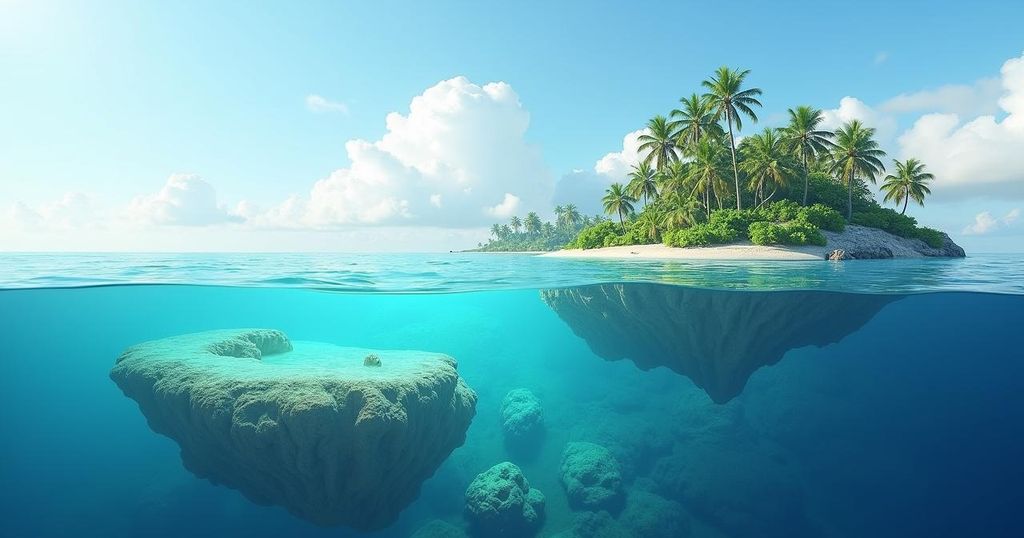U.N. Calls for Urgent Action as Rising Seas Threaten Pacific Island Nations

U.N. Secretary-General Antonio Guterres has issued a climate warning regarding the accelerating rise in sea levels affecting Pacific island nations, emphasizing the need for immediate global action. Reports indicate that these islands face sea level increases that are significantly above the global average, as well as other climate-related challenges. Guterres calls on major greenhouse gas emitters to take responsibility and act to safeguard vulnerable populations.
In a pressing appeal regarding the accelerating rise of sea levels, U.N. Secretary-General Antonio Guterres underscored the alarming situation faced by Pacific island nations. During a meeting in Tonga, he proclaimed that the rising seas present a crisis of human origin demanding immediate global action—coined as “save our seas.” Reports from the United Nations and the World Meteorological Organization (WMO) indicate that the Southwestern Pacific region is not only suffering from higher sea levels, which have risen significantly more than the global average due to climate change, but also from issues such as ocean acidification and marine heat waves. Guterres highlighted data reflecting that in the period from 1990 to 2020, sea levels at Tonga’s capital, Nuku’alofa, increased by 21 centimeters, double the global average rise of 10 centimeters. Similarly, Apia, Samoa, recorded a rise of 31 centimeters, and Suva, Fiji, experienced an increase of 29 centimeters. He pointed out that 90% of people in the region reside within just 5 kilometers of the coastline, putting them in increasing danger as flooding events become more frequent. In Guam, instances of coastal flooding have surged from two occurrences annually to 22. As he reflected on the detrimental impacts of climate change, Guterres observed changes since his last visit in May 2019 and expressed concern for the future of island populations. In addition, local activists, such as Itinterunga Rae, emphasized that relocating populations should not be regarded as a viable solution to the climate crisis, given the cultural disintegration it imposes. The WMO indicated that the western Pacific is experiencing sea level rise at approximately twice the global rate, exacerbated by warmer waters and shifting ocean currents, partly attributed to melting ice in Antarctica and Greenland. Guterres reiterated the urgent need for countries that contribute significantly to greenhouse gas emissions to recognize their responsibilities, particularly the 20 wealthiest nations that contain approximately 80% of such emissions. The data also suggests that global sea levels are rising at the fastest rate witnessed in 3,000 years, increasing significantly over recent decades. This heightening crisis not only threatens the Pacific but also creates vulnerabilities in many coastal cities around the world, necessitating comprehensive action to stem the tide of climate chaos.
The article addresses the critical issue of rising sea levels, particularly impacting Pacific island nations. This phenomenon is primarily driven by climate change, which is causing the melting of polar ice and glaciers, resulting in accelerated sea-level rise. The U.N. has highlighted the alarming rates of increase in the Pacific compared to global averages, raising concerns for the populations living in these vulnerable regions. The report serves as a call to action for global leaders to address these environmental challenges and their disproportionately severe effects on small island nations.
In conclusion, the ongoing rise in sea levels poses an existential threat to Pacific island nations, a situation compounded by the broader effects of climate change. U.N. Secretary-General Antonio Guterres has made it clear that immediate action is necessary to mitigate this crisis, calling for accountability from the world’s largest greenhouse gas emitters. The alarming statistics presented illustrate a rapidly escalating climate emergency, underscoring the urgent need for global cooperation and commitment to sustainable environmental practices.
Original Source: www.voanews.com








